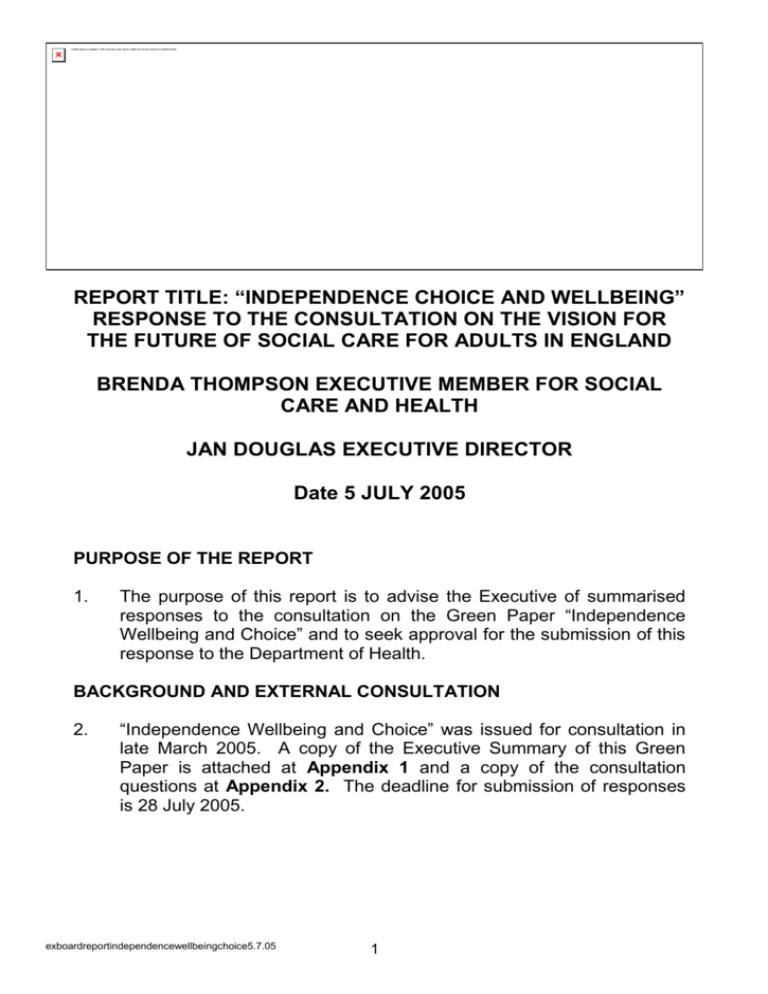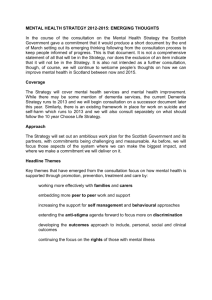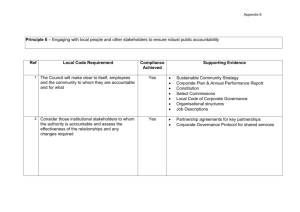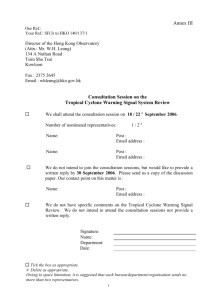(Attachment: 3)exboardreportindependencewellbeingchoice5.7.05
advertisement

REPORT TITLE: “INDEPENDENCE CHOICE AND WELLBEING” RESPONSE TO THE CONSULTATION ON THE VISION FOR THE FUTURE OF SOCIAL CARE FOR ADULTS IN ENGLAND BRENDA THOMPSON EXECUTIVE MEMBER FOR SOCIAL CARE AND HEALTH JAN DOUGLAS EXECUTIVE DIRECTOR Date 5 JULY 2005 PURPOSE OF THE REPORT 1. The purpose of this report is to advise the Executive of summarised responses to the consultation on the Green Paper “Independence Wellbeing and Choice” and to seek approval for the submission of this response to the Department of Health. BACKGROUND AND EXTERNAL CONSULTATION 2. “Independence Wellbeing and Choice” was issued for consultation in late March 2005. A copy of the Executive Summary of this Green Paper is attached at Appendix 1 and a copy of the consultation questions at Appendix 2. The deadline for submission of responses is 28 July 2005. exboardreportindependencewellbeingchoice5.7.05 1 3. Throughout April, May and June 2005 the Senior Management Team within the Department of Social Care have hosted a series of consultation events at which presentations have been made on the key messages contained in the Green Paper. Participants at those events have been invited to respond to the consultation questions. 4. Thirteen separate events have been held attended by approximately 530 people representing users, carers, colleagues from the NHS, VCS and wider community. Summary of Consultation Responses 5. Overall there has been widespread support for the Vision of Adults Social Care as described in the Green Paper and agreement that the 7 outcomes for Social Care accurately reflect what people want and expect (Question 1 and 2). 6. The issue raised in the Green Paper of achieving a balance between personal choice and control with managing risk (Question 3) generated considerable debate. The conclusion was that any shift in the current balance will be dependent upon corresponding shift in public attitudes towards risk, protection and care. At the moment risk aversion seems firmly embedded in the wider values of society and strong doubts were expressed about society’s readiness to move away from this stance. 7. A greater emphasis on provision of preventative services (Question 17) is welcomed. The point was very strongly made however that the provision of low level services may defer but will not necessarily prevent the need for more intensive services particularly given our ageing population. It will also be essential to adequately resource preventative services. Successful implementation of the aspirations set out in the Green Paper cannot be achieved without additional investment (Question 12). 8. Whilst it was recognised that enhanced access to universal services is in itself less stigmatising and more consistent with the objectives of social inclusion, universal services will need more funding to meet the additional demands from people using Adult Social Care Services. It was also emphasised that an evidence base will need to be established for low level interventions and evidence of their cost effectiveness over time. exboardreportindependencewellbeingchoice5.7.05 2 9. There was widespread support for change in the name of Direct Payments as soon as possible, for reviewing the current exclusions and extending Direct Payments to groups currently excluded (Questions 8 and 9). The concept of individual budgets (Question 10) generated a great deal of interest. Most respondents felt that an individual budget would be a good way to ensure choice and control and could also serve to drive up the quality of service provision. Pilot schemes on individual budgets will be welcomed. Respondents considered that many recipients of individual budgets would need support in identifying and accessing services to meet their particular needs. The care navigator or care broker role therefore would be essential. Introducing this role would free up social worker expertise to deal with the most vulnerable (Question 11). The development of client self-assessment (Question 5) and sharing information across agencies such as the Local Authority and Department of Works and Pensions (Questions 4 and 6) was very much supported but the resource implications of this cannot be under-estimated. 10. There was almost total agreement that Adults Social Care cannot deliver this new vision alone or independently with the resources that exist in local communities. It will require skills and capacity beyond those traditionally exercised in the Social Services Departments and similar considerations will need to be applied to those responsibilities relating to community capacity building. Much of this work is part of the wider community leadership role of local government (Question 15). 11. Partnerships with the NHS are important especially in delivering seamless support but they form a relatively small part of the interface between Adults Social Care and other agencies and sectors that need to be engaged in delivering this vision for adults social care. The proposal to develop a strategic commissioning framework was therefore seen as essential (Questions 14, 15 and 16). The low priority given to Supporting Social Care Agencies to develop strategic commissioning expertised compared with that available to the NHS was highlighted (Question 19). Several respondents felt a similar level of investment in learning, leadership, capability and capacity given to the NHS is also needed for Social Care. 12. The requirement to have a statutory post of Director of Adults Social Services and an Executive Member whose portfolio mirrors that of the Director was considered to be the best approach to ensuring leadership at Council Member level (Question 13). exboardreportindependencewellbeingchoice5.7.05 3 13. Targets and performance indicators (Question 21) are reluctantly accepted as a feature of public service which is unlikely to change. However, the overwhelming view expressed by consultees was that greater value and weight must be given to the users experience. Development of performance measures therefore must have this at its core. FINANCIAL, LEGAL AND WARD IMPLICATIONS 14. There are no specific finance, legal or Ward implications arising from this report. SCRUTINY CONSULTATION – 15. A presentation on the Green Paper was given to the Social Care and Adult Services Scrutiny Panel on 16.5.05. All Members of the Council were invited to attend responses to the consultation questions have been incorporated in this overall summary. RECOMMENDATIONS 16. The Executive is recommended to approve the submission of the responses to the consultation on the Adults Green Paper as set out in this report to the Department of Health. REASONS 17. The Department of Health has encouraged widespread consultation and comment on the Green Paper “Independence Wellbeing and Choice”. The closing date for responses is 28.7.05. BACKGROUND PAPERS The following background papers were used in the preparation of this report: “Independence Wellbeing and Choice” Our Vision for the Future of Social Care for Adults in England – Department of Health March 2005. AUTHOR: Jan Douglas TEL NO: 01642 729500 ______________________________________________________ Address: Website: http://www.middlesbrough.gov.uk exboardreportindependencewellbeingchoice5.7.05 4 APPENDIX 1 exboardreportindependencewellbeingchoice5.7.05 5 exboardreportindependencewellbeingchoice5.7.05 6 exboardreportindependencewellbeingchoice5.7.05 7 exboardreportindependencewellbeingchoice5.7.05 8 exboardreportindependencewellbeingchoice5.7.05 9 exboardreportindependencewellbeingchoice5.7.05 10 APPENDIX 2 exboardreportindependencewellbeingchoice5.7.05 11 exboardreportindependencewellbeingchoice5.7.05 12







